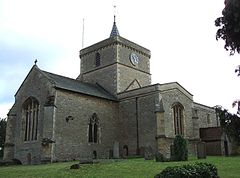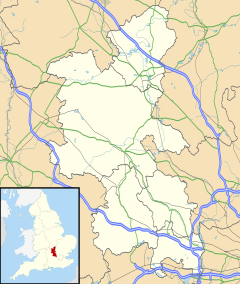Bierton with Broughton
| Bierton | |
|---|---|
 Parish church of St James the Great |
|
| Bierton shown within Buckinghamshire | |
| Population | 2,178 (2011 Census.civil parish including Hulcott) |
| OS grid reference | SP8315 |
| Civil parish |
|
| District | |
| Shire county | |
| Region | |
| Country | England |
| Sovereign state | United Kingdom |
| Post town | Aylesbury |
| Postcode district | HP22 |
| Dialling code | 01296 |
| Police | Thames Valley |
| Fire | Buckinghamshire |
| Ambulance | South Central |
| EU Parliament | South East England |
| UK Parliament | |
Bierton is a village in Buckinghamshire, England, about half a mile northeast of the town of Aylesbury. It is a mainly farming parish, The hamlets of Broughton, Broughton Crossing and Burcott lie within Bierton with Broughton civil parish part of Aylesbury Vale district and forms part of the Aylesbury Urban Area.
A substantial Belgic settlement once occupied the site of the village with an extensive ditched enclosure. Excavations in 1979 detected four phases of occupation. The ditches were deliberately filled in the first century and little is visible today.
The village name was first recorded in the Domesday Book of 1086 as Bortone and means "farmstead near a stronghold" in modern English. The development of Bierton as a village was hampered by its being a linear settlement along the last road leading from Aylesbury to have its toll gate removed. The extra costs involved in travelling northwards using this route deterred many merchants, who favoured the less costly route via Winslow and Buckingham. The village remained an important point on this alternative northward route however, due to the presence of a wagon pond. This was used to swell the wooden axles of carts, and was a popular watering spot for carthorses.
The Church of England parish church of Saint James the Great is largely 14th century. At one time the village contained no fewer than seven public houses and porter houses. The stained glass door of the long since defunct "Star" can still be seen as can that of the "Eagle" next door to the Jubilee Hall. The two remaining pubs are the historically significant Red Lion, and the Bell.
...
Wikipedia

